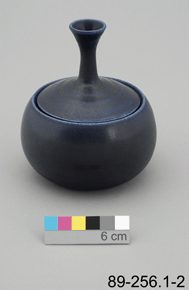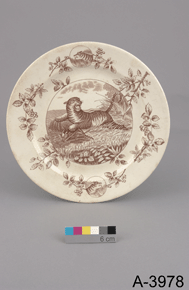Round Artifacts
Type of Artifact
Examples:
- Vase
- Goblet
- Marble
- Other
Mandatory
- Black or neutral grey background

CD2005-0816-D2005-18149 - Artifact catalogue number
- Colour or white-grey-black scale
- Artifact placed straight
- Ensure that the catalogue number and scale can be excluded if necessary
Procedures
Recommendations
In the Studio
- At the beginning of each session with new lighting, adjust the camera's white balance and for reference purposes, photograph a Kodak Q-14 colour scale.
- Import the image into image-processing software (e.g., Photoshop®) and adjust the "levels" on the colour scale with the points of reference indicated in the general guidelines.
- Save the data in ALV format, since this information will apply to all photos taken during the same photography session.

Taking the Picture
- Place the colour or white-grey-black scale (showing measurements) at the foot of the artifact. Save space on the lower right to record the object's catalogue number.
- Photograph the object a single time, with an appropriate measurement scale.
At the Computer - Image-Processing Software
- Apply the ALV information to all images within the same studio session.
- Works well for batch digitization and improves productivity, but does not offer optimal rendering of individual images.
- Type the artifact's catalogue number in the lower right - in white if the background is black, and in black if the background is neutral grey (font: Arial, 40 pts.)
- Flatten the image (i.e., flatten layers)
- Convert in Adobe RGB 1998 profile, 8 bits per channel (total 24 bits).
- Save the image as an uncompressed TIFF, named to standards established by the Corporation's Photo Archives.
- Produce a JPEG version as described in the general guidelines.
Contact information for this web page
This resource was published by the Canadian Heritage Information Network (CHIN). For comments or questions regarding this content, please contact CHIN directly. To find other online resources for museum professionals, visit the CHIN homepage or the Museology and conservation topic page on Canada.ca.